|
|
|
Sort Order |
|
|
|
Items / Page
|
|
|
|
|
|
|
| Srl | Item |
| 1 |
ID:
188818
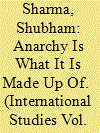

|
|
|
|
|
| Summary/Abstract |
In this article, I attempt to critically assess Kenneth Waltz’s deployment of the idea of anarchy to erect a ‘scientific theory of international politics’. First, I argue that the formation of a concept requires comprehension of the object from the standpoint of historical development, not a narrow reading of it. Second, I subject the thinner abstractions of self-help, balance of power and bandwagoning to the test of history. Third, I argue about mainstream international relations’ disdain for revolutions. I would posit that revolutions are fine templates which store rich agential history of structural transformation, a theme subject to much chagrin by realists of all hues, particularly neorealists. In doing so, I take the Bolshevik Revolution of 1917 as my benchmark. I elucidate that through the occlusion of first and second images, man and state, in the favour of third image, that is, structural anarchy, Waltz tends to ignore the role of agency as a conscious collective which could be best captured by the Bolshevik Revolution. In doing so, I rely on Perry Anderson’s three modes of agency in history. As a corrective to Waltz’s theorization, I make a strong case for class transcending both man and state as an organic category with immense potential of becoming a level of analysis which both acts upon the structure and refracts through it. I finally conclude by saying that anarchy was a condition and not a ‘social relation’ of any sort which could claim to constitute the ‘international’.
|
|
|
|
|
|
|
|
|
|
|
|
|
|
|
|
| 2 |
ID:
111866
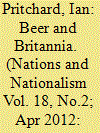

|
|
|
|
|
| Publication |
2012.
|
| Summary/Abstract |
Prior to industrialisation, there was a nebulous and fragmented Welsh national character or mass collective identity. Industrialisation engendered significant sociocultural upheaval and change, and for this 'new' society to function effectively a cohesive Welsh identity had to emerge. Because the impetus behind industrialisation had occurred primarily in a British context, any newly formed Welsh identity would ultimately have to be reconciled to the nation's industrial import within a 'United Kingdom'. Mass cultural commonalities and the role played by leisure in this procedure is a core element in the establishment of industrial modernist nation-states. Therefore, this article argues that public-house culture played a central role in the construction of a new industrial Welsh national ideology that was ultimately allied to, and a constituent of, a British imperial agenda designed to exploit both the natural resources and workforce of the area to its maximum extent.
|
|
|
|
|
|
|
|
|
|
|
|
|
|
|
|
| 3 |
ID:
092544


|
|
|
|
|
| Publication |
2009.
|
| Summary/Abstract |
Fieldwork advice has increased and improved over the years. Yet, the bulk of political science fieldwork advice is general; it assumes that the subject to whom advice is given is simply a political scientist-in training, perhaps-with no other salient identities that might intercede (but see Mazzei and O'Brien 2005 and the PS 2006 fieldwork symposium, The Methodologies of Field Research in the Middle East, for recent exceptions). Of course in reality it is not just the fieldwork setting that varies; the relationship of the researcher to the field matters a great deal-and that may be much more dependent on our specific identities than we have previously credited. It is not simply the subjects that we study, but us as well who have to negotiate sometimes sticky issues of race, class, gender, nationality, and so forth.
|
|
|
|
|
|
|
|
|
|
|
|
|
|
|
|
| 4 |
ID:
075667
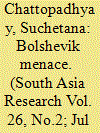

|
|
|
|
|
| Publication |
2006.
|
| Summary/Abstract |
This article examines the impact of the anti-Bolshevik surveillance network created by the colonial state on the urban political milieu of Calcutta during the late 1910s and the early 1920s. The first socialists in Calcutta (1921-24), predominantly Muslims, emerged from the ranks of urban intellectuals and political activists. The article argues that the state's insistence on labelling various social and political segments, including early socialists, as political tools of Moscow demonstrated its inability to grasp the local responses to an international current. It is shown that despite enforcement of various strategies, which tried to anticipate and prevent the spread of socialism, the colonial state failed to counter the emergence of the left in the city.
|
|
|
|
|
|
|
|
|
|
|
|
|
|
|
|
| 5 |
ID:
173437
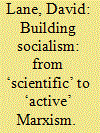

|
|
|
|
|
| Summary/Abstract |
Historical materialism envisages law-like tendencies (‘scientific’ Marxism) promoting the development of productive forces and, concurrently, a political praxis (‘active’ Marxism) requiring human intervention. These positions give rise to conflicting interpretations of Marxism: first to understand society, second to change it – to abolish economic exploitation. The twentieth century witnessed a shift in the locus of the contradictions of capitalism to the economically dependent territories of the imperial powers. Socialist parties, when in power and adopting a Leninist political praxis, furthered modernisation and were successful in reducing economic exploitation. The paper addresses the relationship between the scientific and praxis components of Marxism in contemporary global capitalism. It considers post-Marxist interpretations of the changing class structure, the rise of identity politics and the evolving nature of capital. Forms of domination, oppression and discrimination (bureaucracy, patriarchy, racism, militarism and credentialism) give rise to their own distinctive forms of power relations. It is contended that they should not be equated with Marx’s crucial insight into the nature of economic exploitation. Many current Marxist (and ‘post-Marxist’) writers adopt a ‘scientific’ position emphasising the inherent contradictions of capitalism. The author claims that without appropriate political praxis, the resolution of such contradictions is unlikely to transcend capitalism.
|
|
|
|
|
|
|
|
|
|
|
|
|
|
|
|
| 6 |
ID:
193287
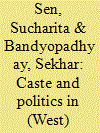

|
|
|
|
|
| Summary/Abstract |
Although many commentators believed that caste did not matter in West Bengal, in recent years it has emerged as a significant factor in electoral politics. The decline of the Left and the rise of the centrist-incumbent have fanned identity politics and the resurgence of caste-based political mobilisation. In this conversation, Sekhar Bandyopadhyay, a well-known expert in the history and politics of caste in Bengal, illuminates the complexities, uniqueness and dynamics of caste politics in colonial Bengal and contemporary West Bengal. The interview explores the evolution of the caste-system in colonial Bengal, its differences with the rest of India and the multiple manifestations of caste-based politics in contemporary West Bengal. Bandyopadhyay reflects on the intersection of caste with other categories of class and religion, the lower-castes’ involvement, appropriation and neglect in the political spectrum, and the future of caste and politics in West Bengal.
|
|
|
|
|
|
|
|
|
|
|
|
|
|
|
|
| 7 |
ID:
113205
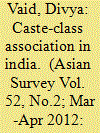

|
|
|
|
|
| Publication |
2012.
|
| Summary/Abstract |
This paper empirically analyzes the association between caste and class in India. I find a tentative congruence between castes and classes at the extremes of the caste system and a slight weakening in this association over time. Although Scheduled Castes have low upward mobility, higher castes are not entirely protected from downward mobility.
|
|
|
|
|
|
|
|
|
|
|
|
|
|
|
|
| 8 |
ID:
126659
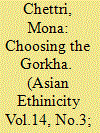

|
|
|
|
|
| Publication |
2013.
|
| Summary/Abstract |
The Darjeeling hills in northern West Bengal, India are being demanded as a homeland for the Gorkha community living in India. While the origin of Darjeeling is steeped in the imperial legacy of the British Raj, the Gorkha, a colonial construct is ironically used as a means to challenge the contemporary political regression and neo-colonisation of Darjeeling. Although the Gorkha identity is deemed as representative of the Nepali community residing in India, it acquires special meaning and importance in the Darjeeling hills, where majority of the people suffer low wages, unemployment, underdevelopment and poverty. In spite of a large working force in the tea estates, economic underdevelopment and political disempowerment is voiced through the assertion of ethnic rather than a class-based identity. Through an examination of the interaction between class and ethnicity, the Gorkha identity will highlight the malleability of ethnicity to extend itself to any situation and the emergence of an ethnic identity from class relations and grievances.
|
|
|
|
|
|
|
|
|
|
|
|
|
|
|
|
| 9 |
ID:
076459
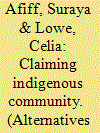

|
|
|
| 10 |
ID:
100273
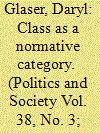

|
|
|
|
|
| Publication |
2010.
|
| Summary/Abstract |
Race and sex/gender are commonly argued to deserve equal priority with class oppression in egalitarian politics. However, placing race and sex in the same list as what is here termed "standard-of-living class" constitutes a category error. Standard of living, alongside power and status, belongs to a distinctive list of "metrics of hierarchy" that should be accorded priority in an important respect: in the specification of the hierarchies (or "distribution strata") that egalitarians seek ultimately to eliminate or reduce. Race and sex, along with other "differentiators," matter primarily for the way they are "used" by social arrangements (e.g., apartheid, patriarchy, capitalism) to assign persons to places in hierarchies of living standard, power, and status. Examining policies to promote black capitalism in post-apartheid South Africa, the author shows how the conflation of differentiators (race, in this case) and distribution strata (like standard-of-living class) is complicit in justifying multiracialized inequality.
|
|
|
|
|
|
|
|
|
|
|
|
|
|
|
|
| 11 |
ID:
180537
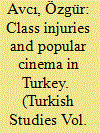

|
|
|
|
|
| Summary/Abstract |
Arabesk is a trademark of popular culture in Turkey. At its foundation lie injuries of class, emotional wounds that society inflicts on people’s sense of dignity and freedom. Literature on arabesk has long underemphasized this salient fact. A syntagmatic and paradigmatic analysis of the narrative structure in thirty melodramas shows that the agony around which arabesk stories unfolds is rooted in class conflict. This study also reveals remarkable parallels between depictions of love in arabesk films from decades ago and the lower classes’ imagination of love today. Thereby, it provides confirmation of the importance of assessing the works of popular culture accurately if we are to better understand the psyche of their target audience in Turkey (and elsewhere in the capitalist world), which is primarily the subaltern segment of society.
|
|
|
|
|
|
|
|
|
|
|
|
|
|
|
|
| 12 |
ID:
089203
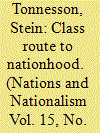

|
|
|
|
|
| Publication |
2009.
|
| Summary/Abstract |
This essay explores the proposition that China and Vietnam represent a fourth class route to modern nationhood, in addition to the ethnic (German), civic (French) and plural (American) routes. Nation-states emerging along the class route are characterised by an exclusive membership based on social class rather than just ethnicity, living under the same laws or participation in liberation from foreign rule. The essay compares China's and Vietnam's class-based nationalism with the more inclusive labour movement nationalisms of Norway and Cyprus. Then it explains how the class route differs from the French civic route. In the conclusion, the author concedes that the Chinese and Vietnamese class route is perhaps a detour rather than a route of its own, since it leads to inevitable tension between the divisive history of how the nation was formed and the need of its later leaders to include and represent the same social classes that were originally excluded. These leaders and their national storytellers are forced to undertake a redefinition of the national self as ethnic, civic and/or plural in an attempt to recreate national legitimacy, often in competition with more radically nationalist opposition groups.
|
|
|
|
|
|
|
|
|
|
|
|
|
|
|
|
| 13 |
ID:
155918
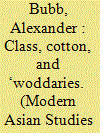

|
|
|
|
|
| Summary/Abstract |
This article makes use of a recently unearthed archive in Sweden, complemented by research in the India Office Records and Maharashtra State Archives, to explore the business networks of the small-scale railway contractor in 1860s Bombay Presidency. The argument centres on the career of one individual, comparing him with several contemporaries. In contrast to their civilian colleagues, freebooting engineers have been a somewhat understudied group. Sometimes lacking formal technical training, and without an official position in colonial India, they were distrusted as profiteering, even corrupt, opportunists. This article will present them instead as a diverse professional class, incorporating Parsis alongside various European nationalities, who became specialists in local milieux, sourcing timber and stone at the lowest prices and retaining the loyalty of itinerant labourers. It will propose that the 1860s cotton boom in western India provided them with a short-lived window of opportunity in which to flourish, and to diversify into a variety of speculative enterprises including cotton trading, land reclamation, and explosives. The accidents and bridge collapses of the 1867 monsoon, and subsequent public outcry, will be identified as a watershed after which that window of opportunity begins to shut. The article's concluding section analyses the contractors’ relationship with their labour force and its intermediary representatives, and strategies for defusing strikes. Ultimately, small independent contractors were agents of modernity not formally affiliated with the imperial project, and forced to bargain with merchants and strikers without official backing. Theirs is a record of complex negotiations at the local level, carried out in the immediate post-Mutiny settlement.
|
|
|
|
|
|
|
|
|
|
|
|
|
|
|
|
| 14 |
ID:
148274
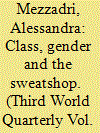

|
|
|
|
|
| Summary/Abstract |
Drawing on approaches to class emphasising the multiplicity of labour relations at work under capitalism, and from feminist insights on oppression and social reproduction, this paper illustrates the interconnection between processes of class formation and patriarchal norms in globalised production circuits. The analysis emphasises the nexus between the commodification and exploitation of women’s labour, and how it structures gendered wage differentials, labour control and the high ‘disposability’ of women’s work. The analysis develops these arguments by exploring the case of the Indian garment industry and its gendered sweatshop regime. It illustrates how commodification and exploitation interplay in factory and home-based realms, and discusses how an approach on class premised on social reproduction changes the social perimeters of what we understand as labour ‘unfreedom’ and labour struggles.
|
|
|
|
|
|
|
|
|
|
|
|
|
|
|
|
| 15 |
ID:
097864
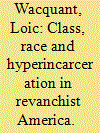

|
|
|
| 16 |
ID:
170477
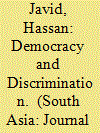

|
|
|
|
|
| Summary/Abstract |
Drawing on fieldwork conducted in Indian and Pakistani Punjab, this paper focuses on how, despite membership in or conversion to majority religious communities, former untouchables in both countries continue to experience caste-based discrimination. In India, a rights-based idiom for caste politics is limited by fragmentation within the Dalit community and the compromises required by electoral politics, while the imposition of a totalising Islamic identity by the state has resulted in the erasure of caste from the political discourse in Pakistan. This paper suggests that class-based mobilisation may be a better route to Dalit empowerment on both sides of the border.
|
|
|
|
|
|
|
|
|
|
|
|
|
|
|
|
| 17 |
ID:
120709
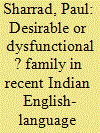

|
|
|
|
|
| Publication |
2013.
|
| Summary/Abstract |
Contemporary Indian English-language fiction marks both a continuous focus on the Indian family as central to society, and also a break from the traditional socialisations of family life. Shifting away from the former calls for reform of marital conventions to accommodate individual needs and many recent novels show families to be dysfunctional sites of domestic violence, incest, extramarital affairs and divorce. Moreover, under the impact of better levels of education, urbanisation and expatriation, the novels of young professional experience tend to portray one's peers as a surrogate family. The idea of family, however, persists.
|
|
|
|
|
|
|
|
|
|
|
|
|
|
|
|
| 18 |
ID:
185763
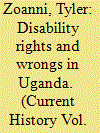

|
|
|
|
|
| Summary/Abstract |
Uganda’s disability story is justly celebrated. The country has ratified some of the most progressive disability laws and policies in the world, and it is home to a robust disability activist movement. Disability is also highly visible in mass media and public life. At the same time, however, these laws, activism, and publicity have not significantly changed the lives of most disabled Ugandans. Uganda’s story is important in its own right, but it also illustrates some of the possibilities and limitations of the rights-based paradigm that now dominates disability activism and politics around the world.
|
|
|
|
|
|
|
|
|
|
|
|
|
|
|
|
| 19 |
ID:
139769
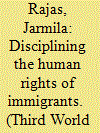

|
|
|
|
|
| Summary/Abstract |
This paper investigates the technologies of controlling migration and how the human rights of third-country nationals are disciplined and limited in many European Union member states. It discusses the rationalities of allowing entry as they are inscribed in the Schengen visa regulations and in the regulations relating to resident permits and family reunification rights in various European countries. Specifically the paper sheds light on how market veridiction results in the disciplining of human rights in these policies. The analysis is conducted through a Foucauldian governmentality framework entailing an analysis of the problematisations of immigration through market veridiction and how these are applied today to limit immigrants’ human rights. The paper then compares these rationalities to eugenic justifications for problematising immigration in the USA from 1860s onwards. This historical comparison shows how social Darwinist notions of human worth continue to function at the level of rationalities and technologies of disciplining immigrants’ human rights. The paper concludes that market veridiction makes human rights function inside a framework of (e)quality in which human worth is calculated as ‘quality’ and not as ‘equality’, and shows how migrants’ human rights are made to function as something to be earned rather than something inherent or inalienable.
|
|
|
|
|
|
|
|
|
|
|
|
|
|
|
|
| 20 |
ID:
181399
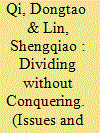

|
|
|
|
|
| Summary/Abstract |
Based on the literature about the role of rising nationalism in recent world politics, this paper proposes a nationalism-oriented causal model to explain the voting choices of different social groups. With an interest-identity framework, this generic model is applied to Taiwan’s 2016 presidential election to examine whether and to what extent 11 causal mechanisms influence the voting choices of four groups defined by generation, class, and ethnicity. The findings not only reveal generational, class-based, and ethnic differences in Taiwanese voting behavior; they also show that the election was largely one of identity politics centered around the issues of national identity and democratic identification, making the “interest card” played by Beijing less effective in swaying voter choices. This explains why Beijing’s divide-and-conquer economic policy successfully divided Taiwanese voters but failed in the end to prevent the pro-independence candidate from winning the election. The findings also indicate that the economic concerns of voters promoted both their Taiwanese identity and support for Taiwan independence, while identification with Taiwan’s democracy contributed directly to the former and only indirectly to the latter. Overall, the model presents a more fine-grained analysis of nationalist politics and may be applied to the studies of other political behaviors involving nationalism.
|
|
|
|
|
|
|
|
|
|
|
|
|
|
|
|
|
|
|
|
|